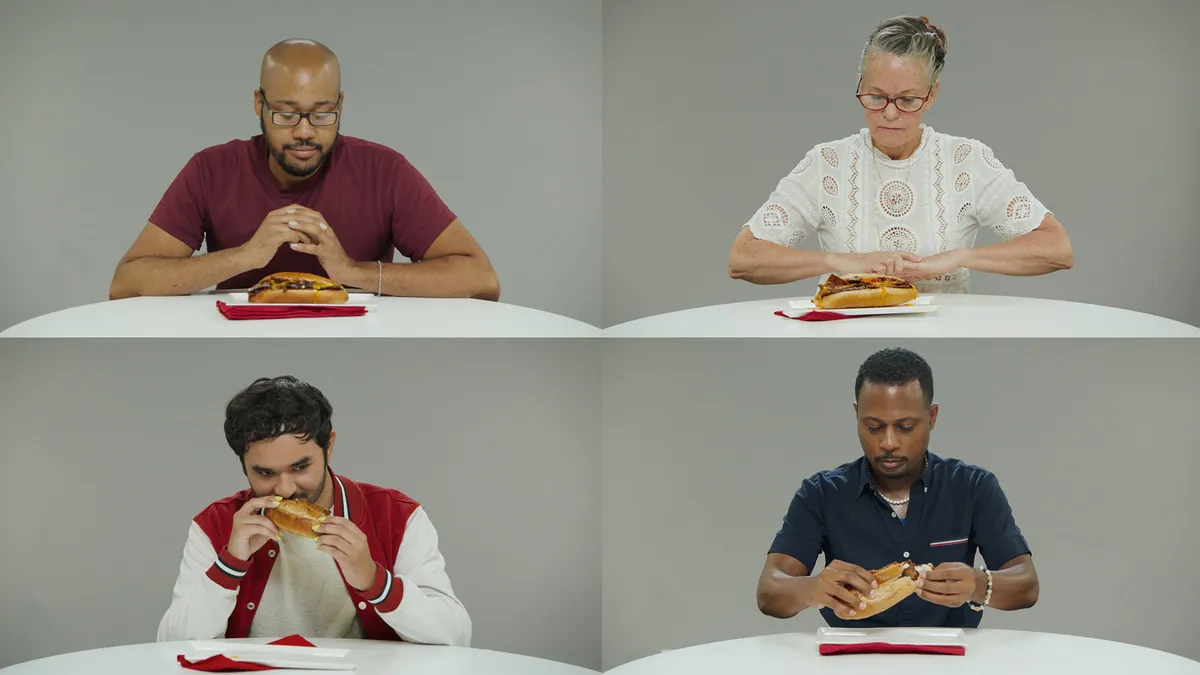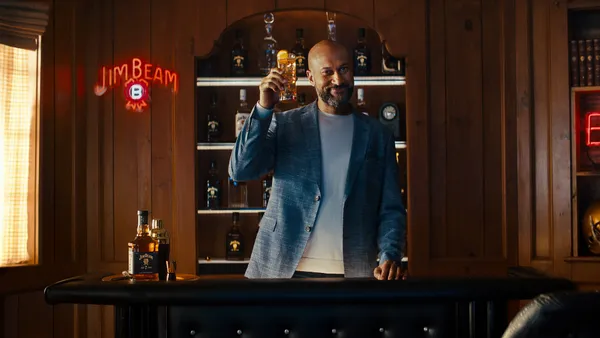Campaign Trail is our analysis of some of the best new creative efforts from the marketing world. View past columns in the archives here.
Deepfakes have played a role in marketing for years, with brands including Michelob Ultra, Mtn Dew, Old Spice and FanDuel using the technology to create pop cultural moments and ride an ever-cresting wave of nostalgia. While an established part of the industry conversation, deepfakes have also raised concerns about contributing to disinformation. Those have only intensified as generative artificial intelligence (AI) makes it even easier for bad actors to manipulate peoples’ likenesses and voices to create ads and unwanted content.
With that in mind, Steak-umm devised a campaign that uses deepfakes to highlight the danger the technology presents, not only to celebrities and politicians, but also ordinary consumers. “DeepSteaks” features a PSA-style video directed by Jason Woliner (“Borat Subsequent Moviefilm”) centered on a fake focus group of real vegans who are given vegan cheesesteaks. A team then uses AI technology to alter their reactions and portray them as meat-eaters, a bit of “fake news” that is met with disbelief and outrage.
Created in partnership with ad agency Tombras, the push includes a call to action around the Deep Fakes Accountability Act, building on the brand’s ongoing efforts to combat misinformation.
Staying authentic
Steak-umm in recent years has attracted attention with earnest social media missives that break from marketer conventions, especially coming from a thin-sliced frozen steak product. A 2020 Steak-umm thread on X, the platform formerly known as Twitter, highlighted the dangers of “misinformation, media inundation, partisanship, and cultural polarization” at the height of uncertainty around the pandemic. The company returned to the theme last year when it jumped on the metaverse bandwagon with a “Meataversity” program.
“The brand is 100% real beef, and they’ve had a platform of basically standing up against anything that’s fake,” said Jeff Benjamin, chief creative officer at Tombras. “A lot of times you have ideas that are pretty good. You present them to a client, and they’re like, ‘What right do we have to do this?’ But for years, the brand has been standing up for ‘100% Real,’ and this was the next chapter.”
That chapter began with a title punning on deepfakes, the rare case where the clever, sticky name came first and the campaign brief followed. Tombras tasked their teams with brainstorming, and the idea of turning vegans into carnivores won the day. Determining tone and tactics was the next challenge.
“As a brand, they don’t irritate people. There has to be intention and purpose, and as we continued to work on it, we [realized] there’s a really powerful [statement] we can put out there into the world,” Benjamin said. “More than your face is at stake here with some of these technologies that are out there.”
Deepfakes delivered in 10 minutes or less
As examples of public figures getting deepfaked piled up, the ability of the technology to undermine the convictions of regular people proved to be chilling. At that point, the Steak-umm campaign shifted from something the brand should do to something it had to do, according to Benjamin. How to actually execute the deepfakes was another complicated question.
“It was news to me that there’s more than one way to do this,” Benjamin said with a laugh.
Tombras quickly learned that the quality of deepfake results was bound by the amount of time and money spent on the technology. For DeepSteaks, the team wanted to be authentic to what a normal person could accomplish and selected off-the-shelf software for the task. The creatives also self-imposed time limits to prove a point. They gave themselves 10 minutes to create the deepfakes — complete with voice clones and AI-assisted lip sync — while interviewees sat in a waiting room in between filming sessions.
“We felt like the results were good,” Benjamin explained. “Were they perfect? No, but they were good enough that when you saw yourself saying that you love meat and you’re vegan, you’re like, ‘What the hell?’”
Those time and cost constraints and a final product that gave individuals pause unscored the message of the campaign: If people can be deepfaked in 10 minutes with software anyone can get, what will happen when the technology gets more sophisticated and omnipresent?
DeepSteaks generated 4.5 million views on TikTok and 1 million views on Instagram, with thousands of comments, demonstrating how Steak-umm continues to be a source — albeit an unlikely one — of information about misinformation. Benjamin cited a quote that positions brands as a tool to “help humanity scale” that helps encapsulate the company’s purposeful ethos.
“I firmly believe that every brand has an opportunity, in their own way, to do something intentional and also sell lots of products,” Benjamin said. “We’re lucky in that we have fans of the brand that don’t want to just be entertained. They find enjoyment in something intentional.”























